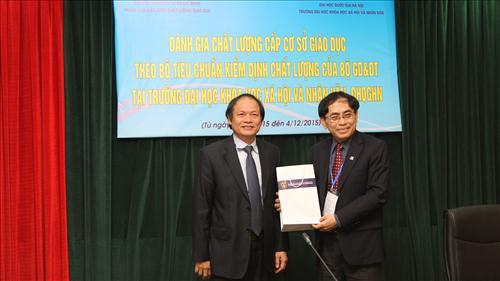
The external evaluation team attending the meeting consisted of 5 members: Assoc. Prof. Dr. Nguyen Hoi Nghia - Team Leader; Assoc. Prof. Dr. Do Hanh Nga - Secretary; Dr. Nguyen Kim Dung - Permanent Member; MSc. Lam Tuong Thoai - Member; MSc. Dinh Tuan Dung - Member; and also MSc. Ho Dac Hai Bien - Secretariat.
On the part of the University of Social Sciences and Humanities, Vietnam National University, Hanoi, the members included Prof. Dr. Nguyen Van Khanh, Rector of the University; Assoc. Prof. Dr. Pham Quang Minh, Vice Rector of the University; Assoc. Prof. Dr. Tran Thi Minh Hoa, Vice Rector of the University; and all members of the self-assessment council as decided by the University.
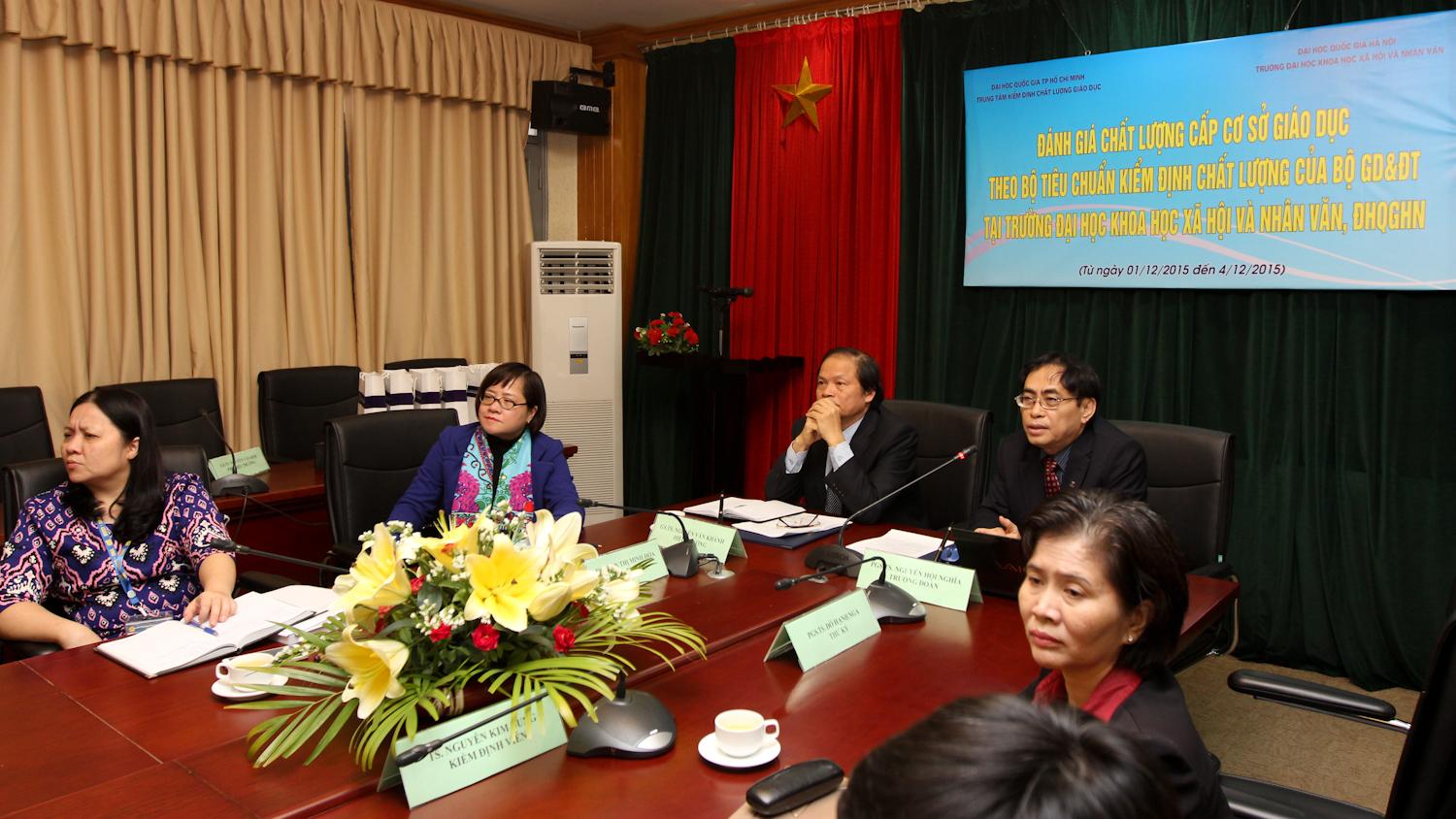
Assoc. Prof. Dr. Nguyen Hoi Nghia (Head of the evaluation team) announced the work that had been completed.
Speaking at the meeting, Associate Professor Dr. Nguyen Hoi Nghia, on behalf of the external evaluation team, expressed gratitude to the Party Committee, the Board of Directors of the University, the management staff, lecturers, employees, students, postgraduate students, alumni, businesses, etc., for their invaluable support to the team during the past period.
Associate Professor Dr. Nguyen Hoi Nghia shared: "The comprehensive evaluation process of a university is a very difficult one, requiring many discussions to be completed. Today's meeting is just the final meeting in the official survey and evaluation period at the university. After this meeting, the external evaluation team will write the external evaluation report and send the draft to the Center for Educational Quality Accreditation for reporting. At the same time, the Head of the evaluation team will also send the complete draft, including 61 criteria, to the university. After receiving the complete draft evaluation, the university will have time to study it and send a response letter to the external evaluation team. After receiving the response letter, the external evaluation team will review it and send a notification to the educational institution containing their opinions, and finally, the team will officially send the external evaluation report to the accreditation organization."
Following their presentation, the external evaluation team reported on the work completed; highlighted their findings from their four-day visit and evaluation of the school; and finally presented preliminary results based on 10 standards. Each standard included three main points: strengths, weaknesses, and recommendations for improvement from the team.

Assoc. Prof. Dr. Tran Ngoc Lieu (Head of Training Department) speaks at the working session.
Responding to the delegation's report, Associate Professor Tran Ngoc Lieu, Head of the Training Department of the University, added: The University has 23 training majors - 29 standard single degree programs and 157 double degree programs (second majors). Specifically, 4 majors that meet social needs are designed by the University with the total of all other majors in the University of Social Sciences and Humanities, Vietnam National University, Hanoi. Students of the University can study any major in addition to the above, and can also study one of four additional majors: Journalism and Communication, International Studies, Tourism Service Management, and Management Science. These four majors are designed as a second degree with the University of Foreign Languages of Vietnam National University, Hanoi; in addition, there are 2 history and literature majors in collaboration with the University of Education.
This design is like a menu, giving students choices, and the number of students registering for it is increasing day by day, said Associate Professor Tran Ngoc Lieu.
Regarding the evaluation team's comments on course registration, Associate Professor Tran Ngoc Lieu provided further information on the implementation of course registration at the University of Social Sciences and Humanities, Vietnam National University, Hanoi. This process can be divided into two stages. In the first stage, students faced many difficulties and hardships due to the poor information technology infrastructure... But from 2014 to the present, course registration has become much more convenient, and students have virtually no complaints.
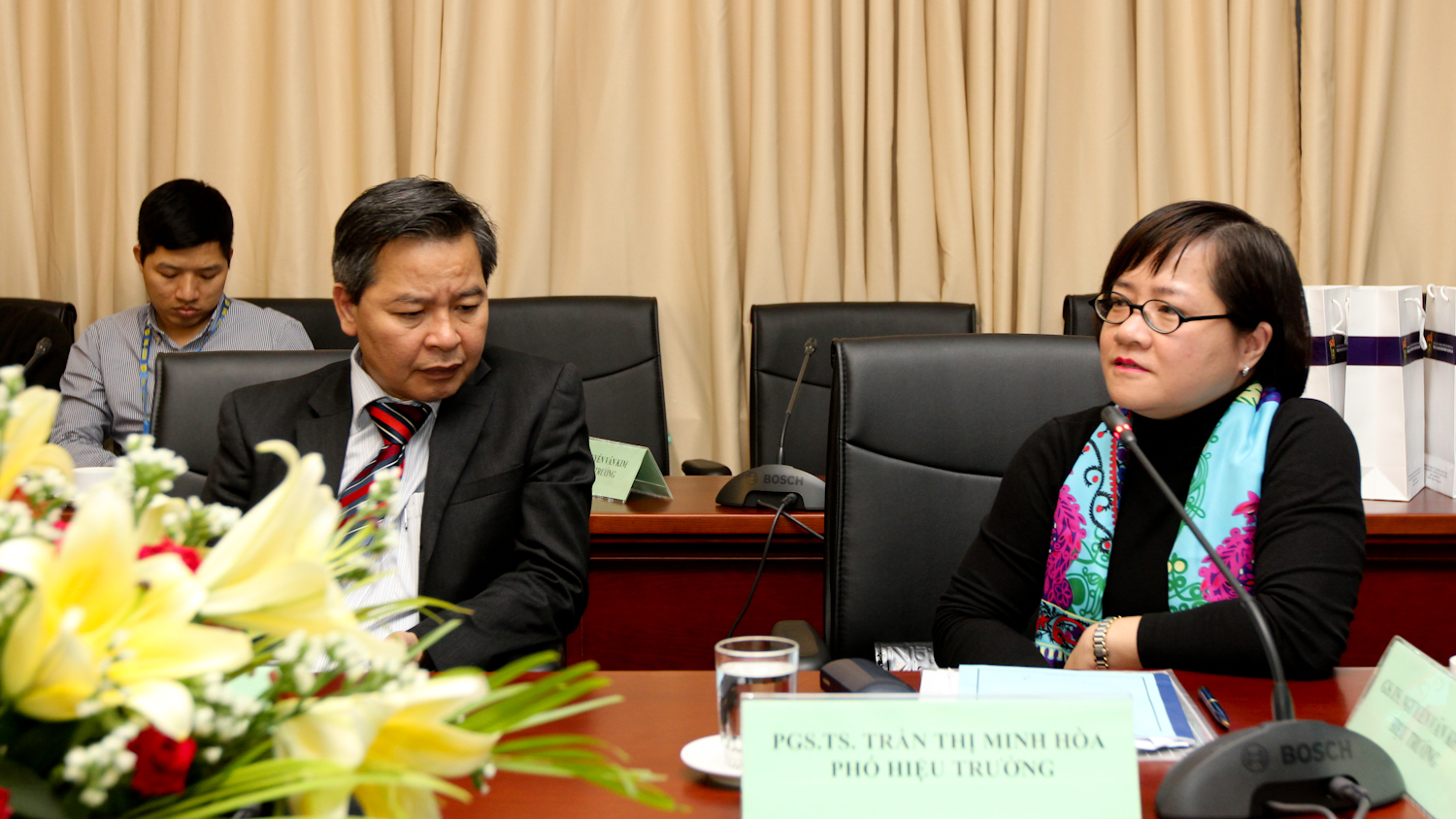
Associate Professor Tran Thi Minh Hoa (Vice Rector of the University) speaks at the working session.
To further discuss the infrastructure and financial aspects with the evaluation team, Associate Professor Tran Thi Minh Hoa, Vice Rector of the University, shared: Regarding the University's infrastructure, there are assets that have exceeded their depreciation period but have not yet been liquidated because the University benefits from diverse sources of assets, not only from the University's own resources but also from donations from embassies and organizations... All assets purchased by the University are subject to strict regulations, with annual comprehensive inventories and liquidation when due. Other asset sources, however, often depend on the opinions of the donors.
Regarding the school's financial budget and expenditure reports, they often depend on various circumstances. The school usually plans a lower budget than its actual revenue, as it aims for diversified revenue streams from centers, services, companies, and, in addition, revenue from international students, which fluctuates depending on objective circumstances and is difficult to control.
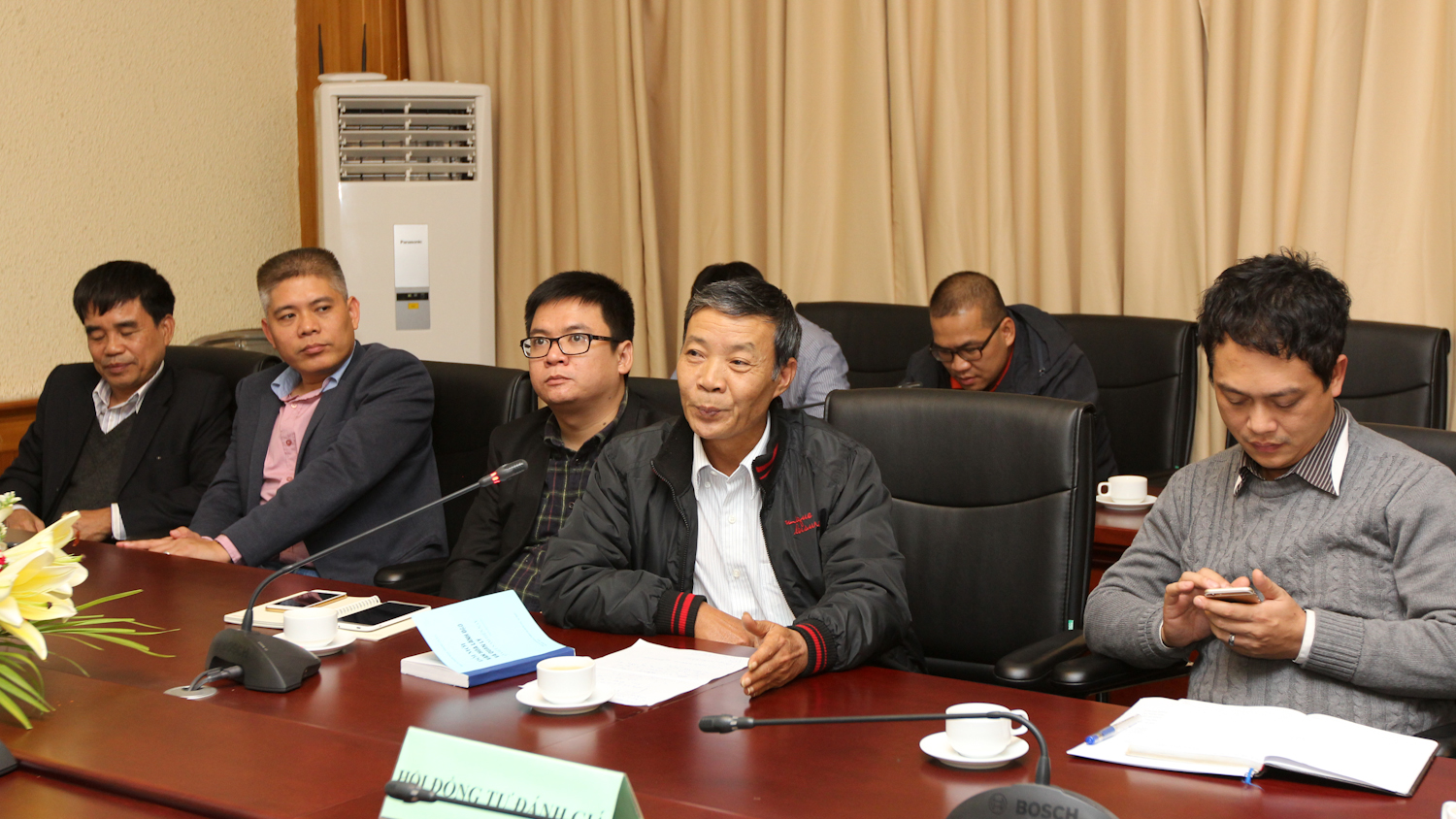
Dr. Hoang Van Luan (Head of the Scientific Research Management Department) spoke at the working session.
Dr. Hoang Van Luan, representing the University's Scientific Research Management Department, also provided feedback on the output of scientific research projects. He noted that until 2014, Vietnam National University, Hanoi (VNU) only issued clear regulations regarding the output of research projects (specifically, published articles must clearly state which product each article belongs to). Based on this, some projects underway in 2012-2013 had already published articles that did not comply with this regulation, resulting in some articles lacking the project's original focus.
In his remarks at the meeting, Professor Dr. Nguyen Van Khanh, the Rector of the University, highly appreciated the results of the external evaluation team's work, stating, "The members of the team, under the leadership of Associate Professor Dr. Nguyen Hoi Nghia, worked very actively and professionally, with high intensity, and achieved good results."
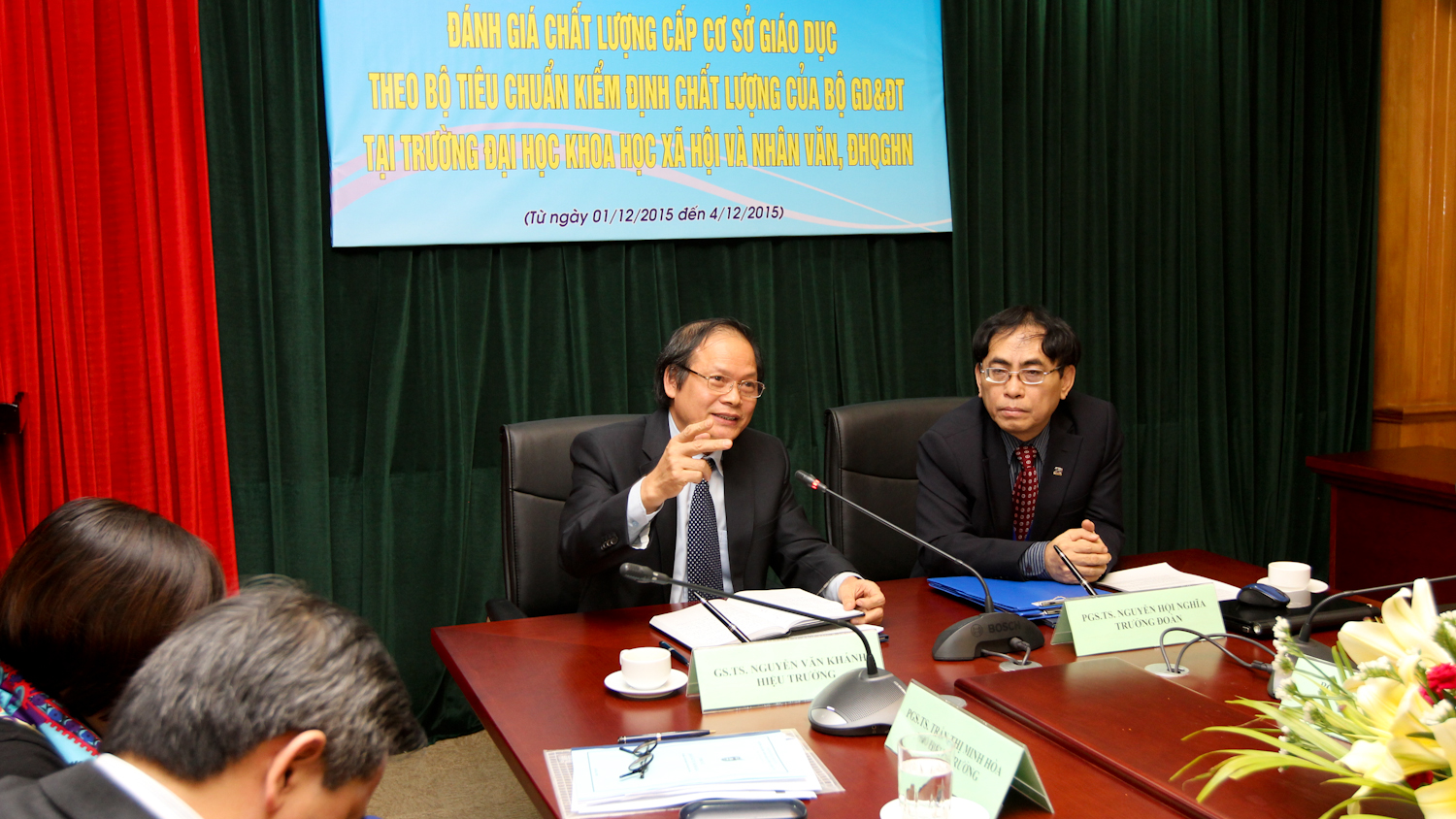
Professor Dr. Nguyen Van Khanh (Rector of the University) delivered a speech giving guidance.
The assessments of strengths, weaknesses, and the recommendations made by the evaluation team are relatively consistent with the current conditions of the University of Social Sciences and Humanities, Vietnam National University, Hanoi. Based on providing additional information for the evaluation team to consider further, Professor Nguyen Van Khanh emphasized several points:
The University of Social Sciences and Humanities, Vietnam National University, Hanoi, has repeatedly developed regulations on management decentralization within the university. Specifically, the latest document, issued in 2015, is based on new government decrees concerning the two national universities. In addition, there are regulations on management decentralization and guidelines for operational procedures at the University of Social Sciences and Humanities, Vietnam National University, Hanoi.
Regarding the social sciences and humanities sector, the research funding of the University of Social Sciences and Humanities, Vietnam National University, Hanoi, is likely the highest in the country. Specifically, in the five years from 2010 to 2015, the University implemented approximately 20 state-level research projects and about 14 projects funded by the basic research fund (not including projects at the institutional and national university levels). Therefore, increasing scientific funding to align with the future direction of building a research university will be a challenging task.
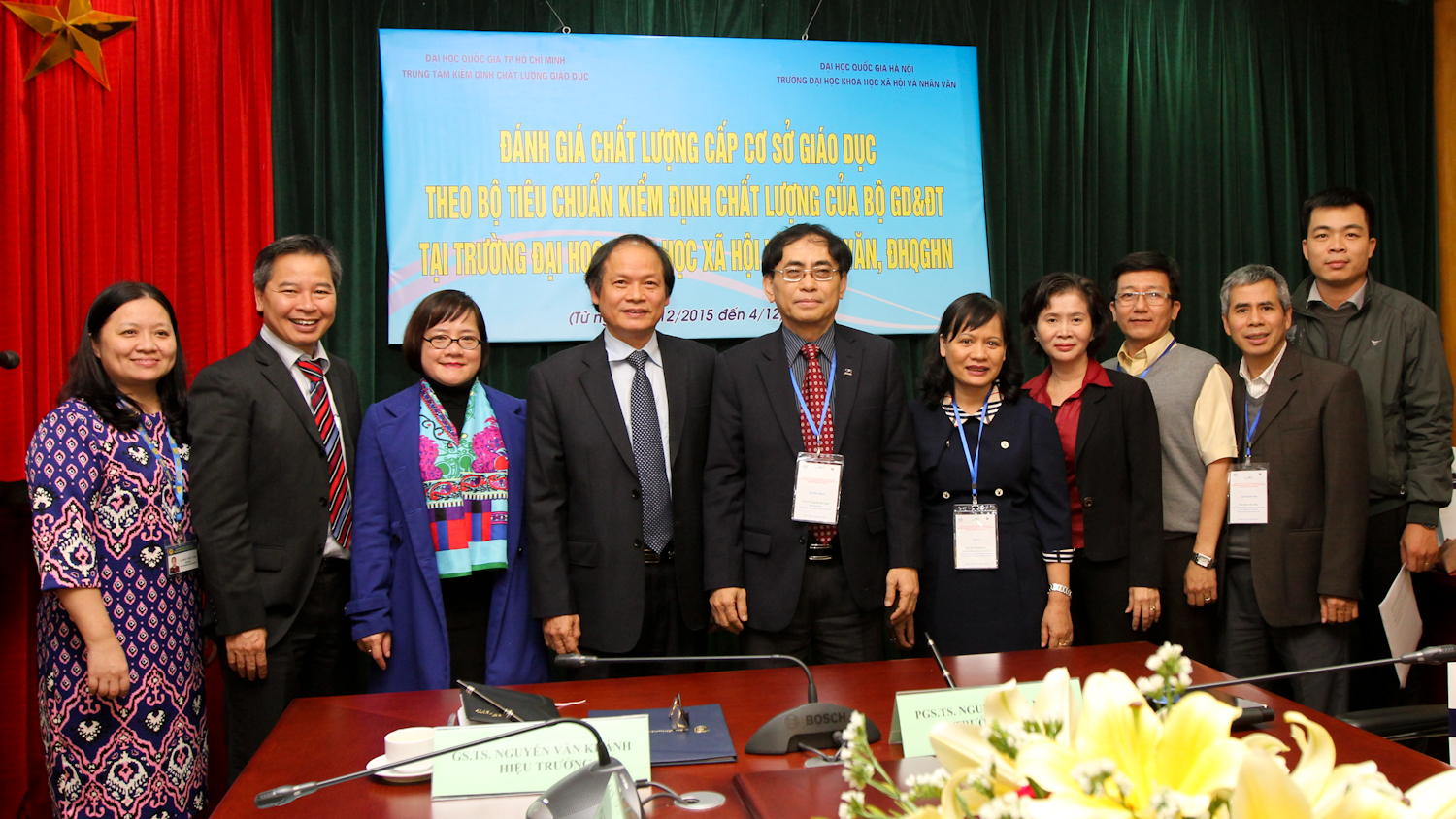
The Board of Directors of the University of Social Sciences and Humanities, Vietnam National University, Hanoi, took a commemorative photo with the evaluation team.
Regarding the faculty, due to regulations of the Vietnam National University, Hanoi and the limited supply of PhDs in social sciences, coupled with the fact that the university's talent attraction policies are not yet strong enough, some criteria for the faculty are still not fully met.
Regarding the digitization of documents in the faculties, the University has had a policy for a long time to digitize all documents and connect them to the network so that they can be accessed from anywhere, but it has not yet been approved by the Vietnam National University, Hanoi. Intellectual property registration activities follow the general regulations of the Vietnam National University, Hanoi.
Author:Dinh Hau
Newer news
Older news